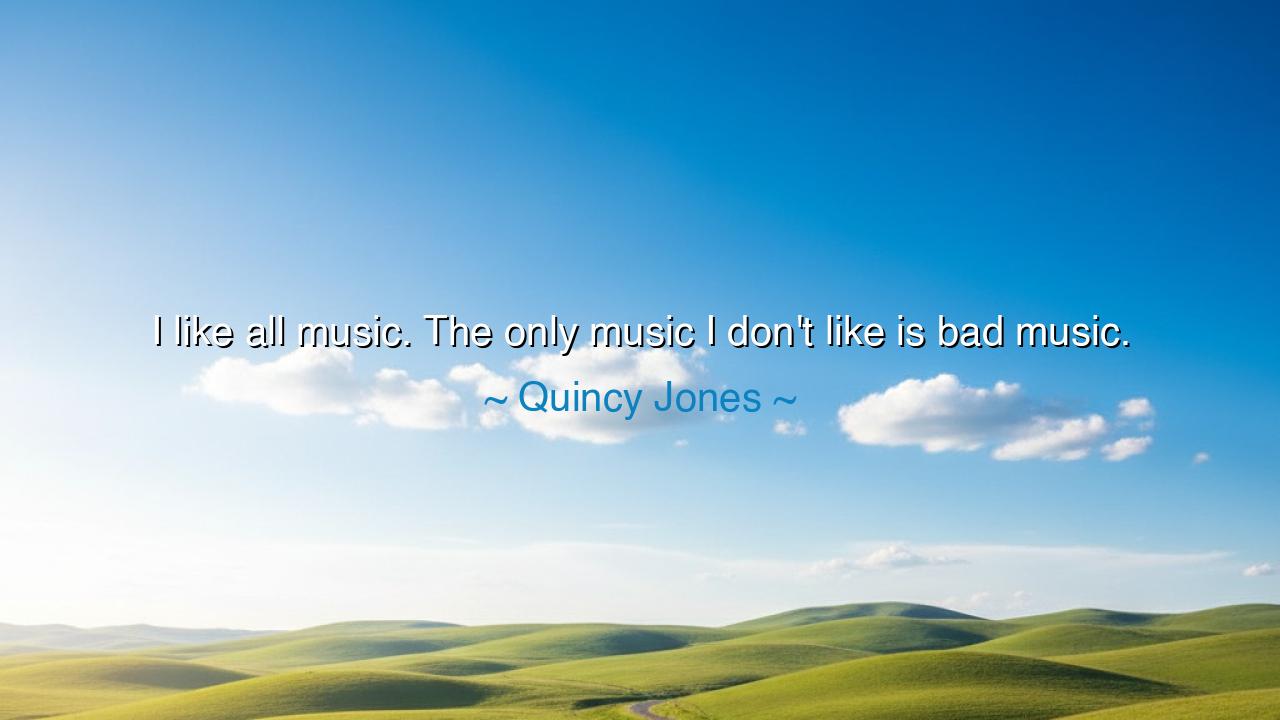
I like all music. The only music I don't like is bad music.






Hear the words of Quincy Jones, master of sound and architect of generations, who declared: “I like all music. The only music I don’t like is bad music.” At first, these words appear simple, even playful. But within them lies a truth as deep as the ocean—that art cannot be judged by its style, its origin, or its name, but only by its spirit, its honesty, its power to move the heart. He does not divide between genres, nor does he dismiss the new or the old. Instead, he proclaims that all music has worth if it is true, and that only the false, the hollow, the careless should be cast aside.
The ancients knew this wisdom. Pythagoras, who listened to the harmony of numbers, declared that all sound, if aligned with truth, could reflect the order of the cosmos. He did not separate the song of the lyre from the chant of the temple; he sought the hidden harmony that gave them both power. So too does Quincy Jones remind us: it is not the shape of music that matters, but whether it resonates with truth. What he names as “bad music” is not that which is strange to the ear, but that which is lifeless, careless, devoid of soul.
Consider the story of Duke Ellington, who once said, “There are only two kinds of music: good and bad.” He, like Quincy, crossed every border—jazz, blues, classical, sacred, and popular—because he knew that true music is not bound by category but by quality. When Ellington brought his orchestra to the grand halls of Europe, critics tried to confine him to “jazz.” Yet his works stood proudly beside the symphonies, for they carried the same dignity. He did not care for labels, only for whether the song was honest, moving, alive.
This is what Quincy Jones himself practiced. He worked with Frank Sinatra, Michael Jackson, Miles Davis, Aretha Franklin. Each from a different world, each carrying a different sound. But in all of them, he sought not the label, but the truth of expression. And when he found it, he magnified it. He became not a servant of genres, but a servant of music itself. His saying is born of a lifetime spent listening across boundaries, hearing that the heart beats the same in every rhythm, in every tongue.
The teaching is clear: do not divide the world by names and categories. Look instead for essence. Do not ask, “Is this jazz, rock, pop, classical?” Ask instead, “Is this true? Does this move the heart? Does it awaken something real within me?” If it does, it is good. If it does not, then it is “bad”—not because of its form, but because it failed to carry spirit.
Practical wisdom follows: when you listen, open your ears without prejudice. Try not to reject what is unfamiliar, for it may carry a treasure hidden beneath its strangeness. Let yourself be moved by voices unlike your own, by rhythms you do not know, by sounds from lands far away. At the same time, discern carefully—do not be deceived by glitter without substance. Train your heart to recognize what is genuine, what carries soul, what bears the mark of true craftsmanship and care.
So let Quincy Jones’ words echo through the ages: “I like all music. The only music I don’t like is bad music.” This is more than a preference; it is a philosophy of life. Love widely, without fear of difference. Embrace variety, but discern truth from falsehood. For in this way, you will not only learn to hear music, but to hear life itself—accepting all that is true, rejecting only what is empty. And in such balance, you shall walk in harmony, with ears and heart open to the eternal song.






AAdministratorAdministrator
Welcome, honored guests. Please leave a comment, we will respond soon